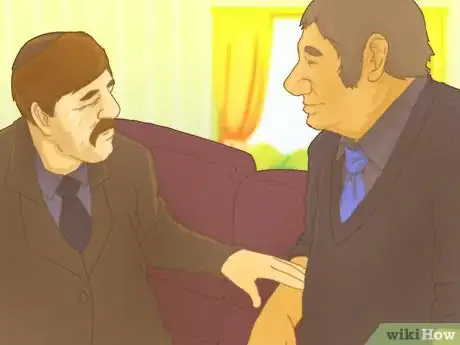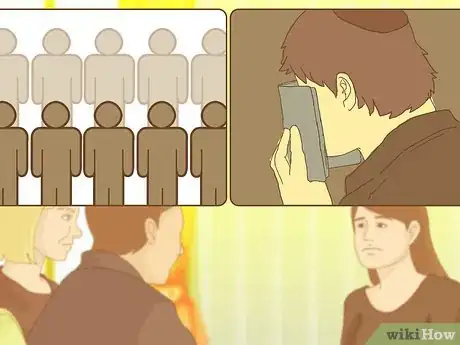This article was co-authored by Ken Breniman, LCSW, C-IAYT. Ken Breniman is a Licensed Clinical Social Worker, Certified Yoga Therapist and Thanatologist based in the San Francisco Bay Area. Ken has over 15 years experience of providing clinical support and community workshops utilizing a dynamic combination of traditional psychotherapy and yoga therapy. He specializes in eclectic non-denominational yoga guidance, grief therapy, complex trauma recovery and mindful mortal skills development. He has a MSW from Washington University in St. Louis and an MA Certification in Thanatology from Marian University of Fond du Lac. He became certified with the International Association of Yoga Therapists after completing his 500 training hours at Yoga Tree in San Francisco and Ananda Seva Mission in Santa Rosa, CA.
There are 8 references cited in this article, which can be found at the bottom of the page.
wikiHow marks an article as reader-approved once it receives enough positive feedback. In this case, 100% of readers who voted found the article helpful, earning it our reader-approved status.
This article has been viewed 34,166 times.
There are many Jewish laws dealing with proper behavior after the death of a loved one. These rules are designed to show respect for the deceased and to give comfort to those mourning them. Following these traditional rules is important so that you do no inadvertently disrespect someone when they are in their time of mourning. With a little research, you’ll know exactly how to treat a Jewish mourner respectfully.
Steps
Showing Respect to Those Who are in Mourning
-
1Maintain a respectful attitude. When visiting a Jewish person who is in mourning, it is important to maintain a respectful demeanor. Don’t joke around or talk about frivolous topics. Remember that you are there to show your respect for the dead and to comfort the deceased’s family and friends.[1]
- A mourner is usually considered a spouse, parent, sibling, or child of the deceased.
-
2Allow the mourner to initiate conversations. It is very important in Jewish law for mourners to be allowed to grieve fully, especially in the days directly following the death of their loved one. During this time, it is customary to allow the person mourning to initiate conversations so that they may grieve in their own way, alone if they want or with others if that is what they choose.Advertisement
-
3Don’t divert the conversation away from the topic of the deceased. When you are calling on friends or family during their period of mourning, it is important to allow them to fully express their grief during this time. Thus, it is inappropriate to change the topic or to avoid conversation about the deceased in general.[2]
- You should encourage the mourner to talk about the deceased if they want to.
- You can relate fond memories of the deceased or other positive topics, but do not bring up anything that would cause more grief for the mourner.
-
4Avoid shallow platitudes. These kinds of standard responses to grief minimize the mourner’s emotions during their time of great grief. You should avoid saying things like this because the mourner may feel like you are simply trying to placate them.[3]
- Some examples of things to avoid include “Everything happens for a reason” or “Time heals all wounds.”
- There's really no right thing to say to a mourner. So, putting the pressure on yourself to come up with the right thing to say is probably only going to be more stressful for you.Do your best to be present, as your presence is usually the best thing you can offer right now.
-
5Say the appropriate farewell words when you leave. As you take your leave of the mourners you are visiting, it is customary to utter some traditional words (often called the Condolence Declaration). This is all part of the ceremony of supporting a mourner during their time of grief.[4]
- The traditional Condolence Declaration when leaving a house of mourning is “May the Almighty comfort you with all the mourners of Zion and Jerusalem.”
Participating in Shiva
-
1Understand what Shiva means. The Jewish family of the deceased person "sit Shiva" at their home. Shiva lasts for seven days and is not allowed on Shabbat, which is from Friday at sundown to Saturday at sundown.[5]
- Sitting Shiva is not simply a social call. The purpose of your visit is to show the mourner that you are concerned about their distress in this time of grief.
-
2Don’t be nervous about attending. Some people become worried about whether or not they should attend Shiva – if they are “close enough” to warrant an appearance. However, showing up at a Jewish house of mourning is the most powerful thing you can do to show you care during this difficult time.
- Don’t ring the doorbell; just walk in. Doors are usually left open during Shiva.
-
3Follow the rules of Shiva. If the family is Chabad or Orthodox, they cover their mirrors and take off their shoes, and they don't work. Friends come to their home to provide help and support and even help them with their daily chores.[6]
- Mourners sit in low chairs, stools, or on the floor. Family and friends can sit in the regular chairs.
- Mourners typically don’t cut their hair, shower, or change their clothes during Shiva.
-
4Pray at Shiva. Traditionally, a group of Jewish men get together at the Shiva and say a prayer called Kaddish. In the Conservative and Reform movements, Jewish women generally are counted as part of the minyan (a group of ten Jewish adults) necessary to say Kaddish. It is a great honor if you can help out to make sure there are ten adult Jews available at the Shiva every day.[7]
Showing Respect to the Dead
-
1Be mindful of shloshim. For a period of 30 days after the burial, there is another period of mourning called shloshim. During this time, mourners are not supposed to attend parties or other celebrations. They also should not cut their hair, shave, or listen to music.[8]
- If you are a friend of a mourner, you should respect their grieving by not inviting them to parties during this period of shloshim.
-
2Unveil the grave. Sometimes after the funeral (about up to a year later), the family and friends return to the cemetery plot for the gravestone to be placed upon it. There is a veil covering the person's name, so they have an “unveiling” memorial ceremony for the deceased person.[9]
- The unveiling ceremony customarily includes a recitation of Psalms, a brief eulogy, removing the cloth from the headstone, a recitation of the El Maleh Rahamim prayer, and the Kaddish prayer (if at least ten people are present).
-
3Practice Yahrzeit (Yiddish: "Time of Year"). On the first anniversary of the death, mourners and friends can remember the deceased. During this ceremony, the sons of the deceased recite Kaddish (Aramaic: "Holy") prayer and take an Aliyah (Hebrew: "Calling up") to read from the Torah.[10]
- This ceremony should take place in a synagogue, if possible.
- At home, a Yahrzeit candle is lit on the anniversary of the deceased.
Community Q&A
-
QuestionIs a sympathy card appropriate?
 Community AnswerYes, a card is always nice, but make sure it is appropriate, and does not contain biblical scripture or images of crosses.
Community AnswerYes, a card is always nice, but make sure it is appropriate, and does not contain biblical scripture or images of crosses. -
QuestionI want to send something to my Jewish friend whose spouse passed away. What is considered proper etiquette?
 Community AnswerTraditionally, neighbors and friends make food and bring it to the house of the mourning family. During Shiva, cooking is not permitted so it is helpful to bring food. They also aren't supposed to leave the house, so it is helpful to just go visit and comfort them.
Community AnswerTraditionally, neighbors and friends make food and bring it to the house of the mourning family. During Shiva, cooking is not permitted so it is helpful to bring food. They also aren't supposed to leave the house, so it is helpful to just go visit and comfort them. -
QuestionShould I take flowers to the widow?
 Community AnswerSome Jewish people prefer not to receive flowers during their period of mourning. Kosher food is always a safer bet.
Community AnswerSome Jewish people prefer not to receive flowers during their period of mourning. Kosher food is always a safer bet.
References
- ↑ http://www.chabad.org/library/article_cdo/aid/370763/jewish/Comforting-the-Mourners.htm
- ↑ http://www.chabad.org/library/article_cdo/aid/370763/jewish/Comforting-the-Mourners.htm
- ↑ https://www.jewishvirtuallibrary.org/jsource/Judaism/death.html
- ↑ https://www.jewishvirtuallibrary.org/jsource/Judaism/death.html
- ↑ http://www.myjewishlearning.com/article/comforting-jewish-mourners-nihum-avelim/
- ↑ http://www.chabad.org/library/article_cdo/aid/281602/jewish/Sitting-Shiva.htm
- ↑ http://www.shiva.com/learning-center/prayers/kaddish/
- ↑ https://www.chabad.org/library/article_cdo/aid/371240/jewish/The-Shloshim.htm
- ↑ http://www.myjewishlearning.com/article/the-tombstone-the-unveiling-and-visiting-the-grave/








































































